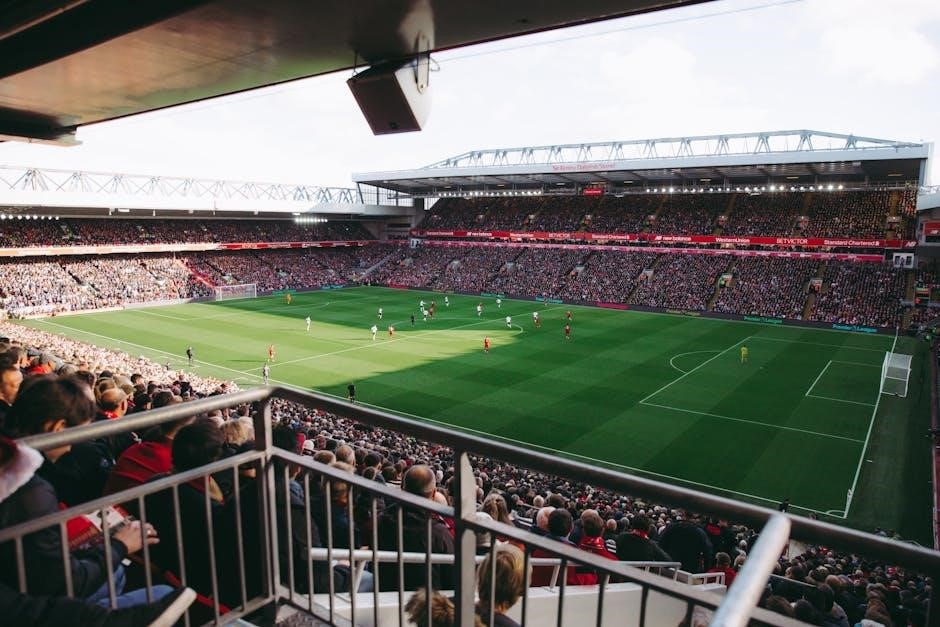
7-day meal plan for athletes pdf
A well-structured 7-day meal plan is essential for athletes to optimize performance, recovery, and overall health by balancing macronutrients, proper hydration, and effective nutrient timing.

Understanding the Nutritional Needs of Athletes
Athletes require a balanced intake of proteins, carbohydrates, and fats to fuel performance and recovery. Proper hydration and calorie intake, tailored to age, weight, and training, are crucial for optimal results.
Protein Requirements for Muscle Repair and Growth
Athletes require 1.2–2.2 grams of protein per kilogram of body weight daily to support muscle repair and growth. High-quality protein sources like lean meats, fish, eggs, and plant-based options are essential. Timing protein intake, such as post-workout, enhances recovery and muscle synthesis. Additionally, hydration is critical, as protein absorption depends on adequate fluid intake. Individual protein needs vary based on training intensity, sport type, and personal goals. For example, endurance athletes may require less protein than strength-trained athletes. A well-structured 7-day meal plan ensures consistent protein intake, promoting muscle maintenance and performance. Consulting a registered dietitian can help tailor protein intake to specific athletic demands, optimizing overall results. Proper protein balance is vital for athletes to recover effectively and achieve peak performance.
Carbohydrates for Energy and Endurance
Carbohydrates are the primary energy source for athletes, fueling workouts and endurance activities. Aim for 55-65% of daily calories from carbs, focusing on complex sources like whole grains, fruits, and vegetables. These provide sustained energy and fiber, supporting digestion and performance. Simple carbs, such as sports drinks or bananas, are ideal for quick energy during intense or long-duration activities. Proper timing of carb intake, such as pre- and post-workout, maximizes glycogen stores and recovery. Hydration is also crucial, as water aids in carb absorption and maintains energy levels. A structured 7-day meal plan ensures athletes meet their carb needs, balancing intake to avoid energy crashes and optimize endurance. Tailoring carb intake to specific training demands helps athletes perform at their best and recover efficiently.
Fats for Sustained Energy and Hormone Production
Fats are essential for athletes, providing sustained energy and supporting hormone production. They account for 20-25% of daily calories, with healthy fats like avocados, nuts, seeds, and olive oil being ideal sources. These fats aid in the absorption of fat-soluble vitamins and maintain hormone balance, crucial for recovery and muscle function; Fats also reduce inflammation and support brain function, enhancing overall performance. Incorporating sources like fatty fish (e.g., salmon) adds omega-3 fatty acids, which are anti-inflammatory. While fats are vital, moderation is key to avoid overconsumption. A balanced intake ensures athletes meet energy needs without compromising macronutrient balance, supporting optimal athletic performance and long-term health.

Hydration and Electrolyte Balance
Hydration is critical for athletes, as water loss through sweat can impair performance and recovery. Aim for 8-10 glasses of water daily, adjusting for sweat levels. Electrolytes like sodium, potassium, and magnesium are lost in sweat and must be replenished. Sports drinks or coconut water can help restore these minerals, especially during intense or prolonged training. Including electrolyte-rich foods like bananas (potassium) and nuts (magnesium) in meals supports balance. Proper hydration ensures optimal bodily functions, including muscle contractions and temperature regulation. Monitoring urine color (pale yellow indicates good hydration) and drinking fluids before, during, and after training can prevent dehydration. Balancing hydration and electrolytes is vital for maintaining energy levels and overall athletic performance throughout the day.
Importance of Micronutrients and Vitamins
Micronutrients and vitamins play a crucial role in supporting athletic performance, immune function, and overall health. Essential vitamins like C, D, and B complex help regulate energy production, reduce oxidative stress, and promote recovery. Minerals such as iron, zinc, and calcium are vital for oxygen transport, immune function, and muscle contractions. Athletes require higher intakes of these nutrients due to increased physical demands. Incorporating foods rich in micronutrients, such as fruits, vegetables, and whole grains, ensures optimal nutrient levels. Deficiencies can lead to fatigue, poor recovery, and increased injury risk. A balanced 7-day meal plan should prioritize variety to meet these needs, potentially including supplements if dietary intake is insufficient. Proper micronutrient intake enhances performance and supports long-term health.

Creating a 7-Day Meal Plan for Athletes
A 7-day meal plan for athletes focuses on balanced nutrition, ensuring optimal energy, recovery, and performance. It incorporates macronutrient balance, hydration, and nutrient timing tailored to individual needs.
Setting Caloric and Macronutrient Goals
Setting caloric and macronutrient goals is crucial for athletes to ensure they meet their energy needs and support muscle repair and performance. A typical 7-day meal plan for athletes is based on an average of 2,300 calories per day, but this can vary depending on factors such as age, weight, training intensity, and specific goals. Protein intake should range from 1;2 to 2.2 grams per kilogram of body weight to support muscle recovery and growth. Carbohydrates, the primary energy source, should account for 45-65% of total calories, while fats, essential for hormone production, should make up 20-35%. Adjusting these ratios ensures the plan aligns with individual needs and promotes optimal athletic performance and recovery.
Balancing Macronutrients in Each Meal
Balancing macronutrients in each meal is vital for athletes to maintain energy levels, support recovery, and optimize performance. Meals should ideally consist of 40-50% carbohydrates for sustained energy, 25-35% protein to repair and build muscle, and 20-30% fats for hormone production and overall function. Carbohydrates, such as whole grains and vegetables, provide quick and long-lasting energy, while lean proteins like chicken, fish, and legumes aid in muscle recovery. Healthy fats, including avocados, nuts, and olive oil, support inflammation reduction and nutrient absorption. Adjusting these ratios based on individual training needs ensures the body is fueled appropriately for both endurance and strength activities, promoting consistency and peak performance throughout the day.
Meal Frequency and Timing for Optimal Performance
Athletes should aim to eat 5-6 meals per day, spaced every 2-3 hours, to maintain steady energy levels and support recovery. Pre-workout meals, consumed 1-3 hours before training, should include complex carbohydrates and lean proteins for sustained energy. Post-workout nutrition within 30-60 minutes is critical for muscle recovery, focusing on protein and carbohydrates to replenish glycogen stores. Hydration should be prioritized, with water or electrolyte-rich drinks consumed before, during, and after workouts. Timing meals around training ensures optimal fueling and prevents energy crashes. Individual needs may vary based on training intensity, duration, and personal goals, but consistency in meal timing is key to enhancing performance and recovery.
Considering Dietary Restrictions and Preferences
Athletes with dietary restrictions or preferences can easily adapt the 7-day meal plan to suit their needs. Vegetarian and vegan options are available by substituting proteins like eggs, meat, or dairy with plant-based alternatives such as tofu, legumes, or nut-based products. For gluten-free diets, whole grains like quinoa, brown rice, and oats can replace gluten-containing foods. Additionally, halal or kosher requirements can be met by selecting appropriately sourced meats. Consulting a registered dietitian ensures personalized adjustments while maintaining macronutrient balance. Tools like the Protein Requirement Calculator help tailor portions to individual needs, making the meal plan flexible and inclusive for all athletes.
Sample 7-Day Meal Plan for Athletes
Athletes with dietary restrictions or preferences can adapt the 7-day meal plan by substituting ingredients while maintaining macronutrient balance. Vegetarian and vegan options replace animal proteins with plant-based alternatives like tofu, legumes, or nut-based products. Gluten-free diets can include quinoa, brown rice, or oats. Halal or kosher requirements can be met by selecting appropriately sourced meats. Consulting a registered dietitian ensures personalized adjustments. Tools like the Protein Requirement Calculator help tailor portions to individual needs, making the meal plan flexible and inclusive for all athletes.
Day 1: High-Protein and Complex Carbohydrates
Start your week with a focus on high-protein and complex carbohydrates to build muscle and sustain energy. Breakfast includes scrambled eggs with whole-grain toast and avocado, providing 35g of protein and 40g of carbs. Lunch features grilled chicken breast with quinoa and steamed vegetables, delivering 50g of protein and 60g of complex carbs. Dinner consists of baked salmon, sweet potatoes, and asparagus, offering 45g of protein and 50g of carbs. Snacks include Greek yogurt with berries and a handful of almonds. Stay hydrated with 8-10 glasses of water. This balanced approach ensures adequate fuel for training while supporting muscle recovery and growth, aligning with the athlete’s caloric needs of approximately 2,300 calories per day.

Day 2: Focus on Lean Meats and Whole Grains
Day 2 emphasizes lean meats and whole grains to maintain energy levels and support muscle function. Breakfast includes turkey bacon, oatmeal, and a banana, providing 30g of protein and 50g of complex carbs. Lunch features grilled turkey breast with brown rice and mixed vegetables, delivering 40g of protein and 60g of carbs. Dinner consists of lean ground beef stir-fried with broccoli and served with whole-grain pasta, offering 35g of protein and 55g of carbs. Snacks include a protein smoothie and a small apple with peanut butter. This meal plan ensures a balanced intake of macronutrients, staying within the 2,300-calorie goal. Proper hydration is essential, with 8-10 glasses of water recommended throughout the day.
Day 3: Incorporating Healthy Fats and Fiber
Day 3 focuses on incorporating healthy fats and fiber to support digestion, energy levels, and overall health. Breakfast includes scrambled eggs with avocado, whole-grain toast, and a handful of berries, providing 25g of protein and 10g of fiber. Lunch features grilled salmon, quinoa, and steamed asparagus, offering 35g of protein and 15g of fiber. Dinner consists of lean chicken stir-fried with spinach, almonds, and brown rice, delivering 30g of protein and 12g of fiber. Snacks include a handful of mixed nuts and a small apple with almond butter. This meal plan emphasizes the importance of healthy fats like avocado and nuts, while fiber-rich foods like whole grains and vegetables promote digestive health and sustained energy. Stay hydrated with 8-10 glasses of water throughout the day.
Day 4: Emphasizing Recovery with Anti-Inflammatory Foods
Day 4 focuses on recovery through anti-inflammatory foods to reduce muscle soreness and promote healing. Breakfast includes oatmeal topped with berries, walnuts, and chia seeds, offering 20g of protein and anti-inflammatory omega-3s. Lunch features grilled chicken breast with a mixed green salad, cherry tomatoes, and olive oil dressing, providing 35g of protein and antioxidants. Snacks include pineapple slices with turmeric-infused Greek yogurt. Dinner consists of baked salmon, roasted sweet potatoes, and steamed green beans, delivering 40g of protein and omega-3 fatty acids. This meal plan emphasizes foods rich in antioxidants and omega-3s, such as fatty fish, nuts, and vibrant fruits and vegetables, to aid in recovery and reduce inflammation. Stay hydrated with herbal teas and coconut water to replenish electrolytes.
Day 5: High-Energy Meals for Intense Training
Day 5 is designed to fuel intense training sessions with high-energy meals. Breakfast includes whole-grain pancakes with fresh fruit and a protein smoothie, providing 30g of protein and 60g of carbs. Lunch features a grilled chicken wrap with quinoa, avocado, and vegetables, delivering 35g of protein and 70g of complex carbs. Snacks include trail mix with nuts, seeds, and dried fruit for quick energy. Dinner consists of salmon, brown rice, and steamed broccoli, offering 40g of protein and 80g of carbs. This meal plan ensures sustained energy levels and supports muscle function during high-intensity workouts. Hydration is emphasized with coconut water and electrolyte-rich drinks to maintain performance and recovery.
Day 6: Balancing Macronutrients for Consistency
Day 6 focuses on maintaining macronutrient balance to ensure consistent energy levels and support athletic performance. Breakfast includes scrambled eggs with spinach, whole-grain toast, and a banana, providing 25g of protein and 40g of carbs. Lunch features a turkey and avocado wrap with mixed greens, offering 30g of protein and 50g of complex carbs. Snacks include Greek yogurt with berries and a handful of almonds for sustained energy. Dinner consists of grilled chicken breast, sweet potatoes, and green beans, delivering 35g of protein and 60g of carbs. This balanced approach ensures steady fueling throughout the day, supporting both training and recovery. Hydration and portion control are emphasized to meet individual caloric needs.

Day 7: Preparing for Game Day or Competition
Day 7 is designed to optimize performance and recovery for game day or competition. Breakfast includes oatmeal with banana and almond butter, providing sustained carbs and protein. Lunch focuses on grilled chicken with quinoa and steamed vegetables, ensuring a balance of carbs, protein, and fiber. Snacks like apple slices with peanut butter or a protein smoothie keep energy levels steady. Dinner features salmon, sweet potatoes, and green beans, offering omega-3 fatty acids, complex carbs, and essential nutrients. Hydration is emphasized with electrolyte-rich drinks to prevent cramps and maintain performance. Meals are timed strategically, with a larger meal 3-4 hours before competition and a light snack 1-2 hours prior to ensure peak readiness.

Optimizing Performance and Recovery
Athletes require a balanced diet, proper hydration, and strategic nutrient timing to enhance performance and recovery. Focus on macronutrient balance, anti-inflammatory foods, and electrolyte replenishment for optimal results.

Pre- and Post-Workout Nutrition Strategies
Pre-workout meals should be consumed 1-3 hours before training, focusing on complex carbohydrates, lean proteins, and healthy fats for sustained energy. Examples include oatmeal with fruit or a protein smoothie. Post-workout nutrition within 30-60 minutes is crucial for recovery, emphasizing protein to repair muscles and carbohydrates to replenish glycogen stores. Hydration is also essential, with electrolyte-rich drinks to restore lost salts. Timing and balance are key to optimizing performance and recovery, ensuring athletes fuel their bodies effectively before and after intense training sessions.
Nutrient Timing for Enhanced Recovery
Nutrient timing plays a critical role in enhancing recovery by aligning food intake with physiological needs. The “anabolic window” within 30-60 minutes post-workout is ideal for consuming carbohydrates and protein to replenish glycogen and repair muscles. Prioritizing high-quality protein (1.2-2.2g/kg/day) and complex carbs ensures sustained recovery. Additionally, spreading meals evenly throughout the day maintains metabolic balance and supports muscle synthesis. Recovery-focused meals should include anti-inflammatory foods, omega-3 rich sources, and electrolytes to combat oxidative stress and restore hydration. Consistency in timing and macronutrient balance is key to optimizing recovery and performance for athletes.
The Role of Sleep in Athletic Performance
Sleep is a cornerstone of athletic performance, directly impacting recovery, physical repair, and cognitive function. During sleep, the body repairs muscles, rebuilds tissue, and enhances strength, while the brain processes memories and sharpens focus. Athletes require 7-9 hours of quality sleep per night to optimize these benefits. Poor sleep quality can lead to decreased reaction times, reduced endurance, and impaired decision-making. Establishing a consistent sleep schedule, creating a relaxing bedtime routine, and avoiding screens before bed can improve sleep hygiene. Prioritizing sleep alongside nutrition and training ensures athletes perform at their peak, making it a vital component of any 7-day meal plan for athletes.

Meal Prep and Hydration Tips
Meal prepping ensures consistency and convenience, while hydration strategies like drinking water and electrolyte-rich fluids optimize athletic performance and support muscle function during training and recovery.
Meal Prepping for Convenience and Consistency
Meal prepping is a game-changer for athletes, ensuring they stay fueled and focused throughout the week. By preparing meals in advance, athletes can save time, maintain consistency, and avoid unhealthy choices. Using reusable containers and labeling meals for each day simplifies the process. Portion control is key to meeting caloric and macronutrient needs. Incorporate a variety of nutrient-dense foods like lean proteins, whole grains, and vegetables to keep meals balanced and satisfying. Staying hydrated is also crucial, so include water-rich foods and electrolyte-rich beverages in your prep. A well-planned meal prep strategy helps athletes perform at their best and supports recovery. Customize your plan with a registered dietitian to tailor it to your specific goals and dietary preferences for optimal results.
Hydration Strategies for Athletes
Proper hydration is vital for athletic performance and recovery, as even mild dehydration can impair physical output and focus. Athletes should drink water regularly throughout the day, aiming for at least 8-10 glasses daily. Pre-workout hydration is essential, with 16-20 ounces of water 1-2 hours before training. During intense or prolonged sessions, sports drinks containing electrolytes can help replenish lost salts and maintain fluid balance. Post-workout, prioritize water or electrolyte-rich beverages to restore hydration levels. Monitor urine color—it should be pale yellow to indicate proper hydration. Incorporating water-dense foods like fruits and vegetables into meals can also contribute to overall hydration. Consistent hydration habits support energy levels, muscle function, and recovery, ensuring athletes perform at their best.
A well-structured 7-day meal plan tailored for athletes is a powerful tool to enhance performance, recovery, and overall health. By focusing on balanced macronutrients, proper hydration, and strategic meal timing, athletes can fuel their bodies to meet the demands of training and competition. This plan emphasizes nutrient-dense foods, hydration strategies, and tailored calorie intake to support energy levels and muscle repair. Whether you’re preparing for game day or recovering from intense workouts, a thoughtfully designed meal plan ensures you’re performing at your best. Download the PDF to access a comprehensive guide and take the first step toward optimizing your athletic potential and achieving peak performance.

Where to Find a 7-Day Meal Plan for Athletes PDF
Accessing a tailored 7-day meal plan for athletes is straightforward, with numerous resources available online. Websites like zonediet.com and nutrition-focused platforms offer downloadable PDFs designed for athletes, often based on expert recommendations. Additionally, registered dietitians and sports nutritionists provide customizable meal plans that cater to specific needs. You can also find comprehensive guides on platforms like HubSpot, which include detailed meal schedules and nutritional advice. For convenience, search for “7-day meal plan for athletes PDF” to explore free and paid options, ensuring you choose a plan aligned with your training goals and dietary preferences. Downloading a reliable PDF will help you streamline your nutrition strategy and enhance your athletic performance effectively.